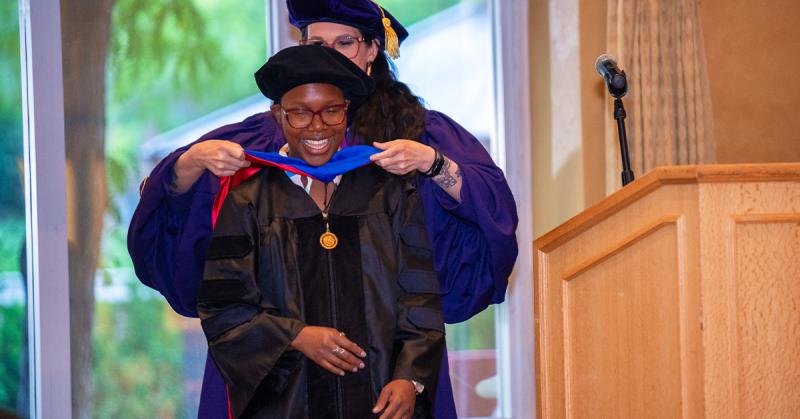Continuing a Legacy of Care
Recent PhD grad Zean Dunbar studies care practices and mutual aid among Black newcomer social workers

Recent University of Denver Graduate School of Social Work doctoral graduate Annie Zean Dunbar, PhD ’24, immigrated from Liberia as a child when her family fled civil war. Although she was acculturated in the United States and is a U.S. citizen, some of her family members, including older siblings, have had a very different experience.
Dunbar’s experience navigating the world as both a Black American and an immigrant has shaped her research and teaching. She says, “I’ve always been curious about how we learn things, how we pick things up, how hidden curricula shape our lives. I came to social work because I was curious about how individuals and systems intersect.”
For her dissertation — The Role of Care Practices, Mutual Aid, and Racial Formation in Black Newcomer Practitioners’ Lived Experience within Organizations: A Critical Qualitative Inquiry — Dunbar interviewed 17 Black direct service practitioners from 14 nations who work across the United States. She sought to understand how their lived experiences as newcomers to the United States informed their professional work with other immigrants.
For the project, Dunbar used a critical discourse analysis — thinking about language and its use — a method not often used in social work research. She explored how the language participants used was related to power and identity. Although participants had varied identities and experiences, many used similar language to describe identity formation, their work and its relationship to care. Dunbar notes that participants described their work as a legacy of care. “They had very similar ideas about showing up for clients and what it means to be cared for.”
Dunbar is continuing that legacy herself as a clinical assistant professor of social work at the University of Colorado–Colorado Springs College of Public Service.
Dunbar’s dissertation research emerged from her mutual aid work in Chicago. According to Dunbar, “All of it stems from [an] appreciation for those who care for others who have been made invisible. Of all the things that people could be doing, they chose to be care providers to people who others throw away. I feel a lot of gratitude for people who are making it easier for those who are just coming and those who are yet to come.”
Dunbar helped to establish the Mutual Aid Collective at GSSW and says that carefully considering the relationship between social work and care practices was one of the most rewarding aspects of her dissertation research. She explains, “Thinking about care as multidirectional and across time, it’s like a circle: I give to you, they give to someone else, and it comes back around.” Participants talked about how they received care and support from their loved ones and the larger community, and they wanted to pass that on.
She adds that “seeing the person as a holistic and complicated person who both receives and gives care was an interesting finding” that reframes the role of social workers as both care givers and care recipients.
Dunbar hopes her research can help to increase awareness of the experience of newcomers to the United States and better meet their needs. She notes that for those who don’t have asylum, services generally don’t exist. “We don’t do a great job of thinking about these folks — it’s a very invisible population. But a lot of us, from case managers to those who are in the policy sector, impact the lives of newcomers.”
She challenges social work to do a better job of incorporating global perspectives while recognizing newcomers who are seeking services — including those who are refugees or seeking asylum — not as a special interest group, but rather as lower income people who have the same fundamental needs as everyone else: “We want housing, safety, the space to thrive.” Dunbar also hopes to see more advocacy, including efforts to humanize the people social workers are working with.
Despite the barriers study participants face — from a lack of funding to outright racism — Dunbar says they remained optimistic. That’s an outlook she shares. “There was a feeling that if you can alleviate the suffering of one person, you’re doing good work.”




